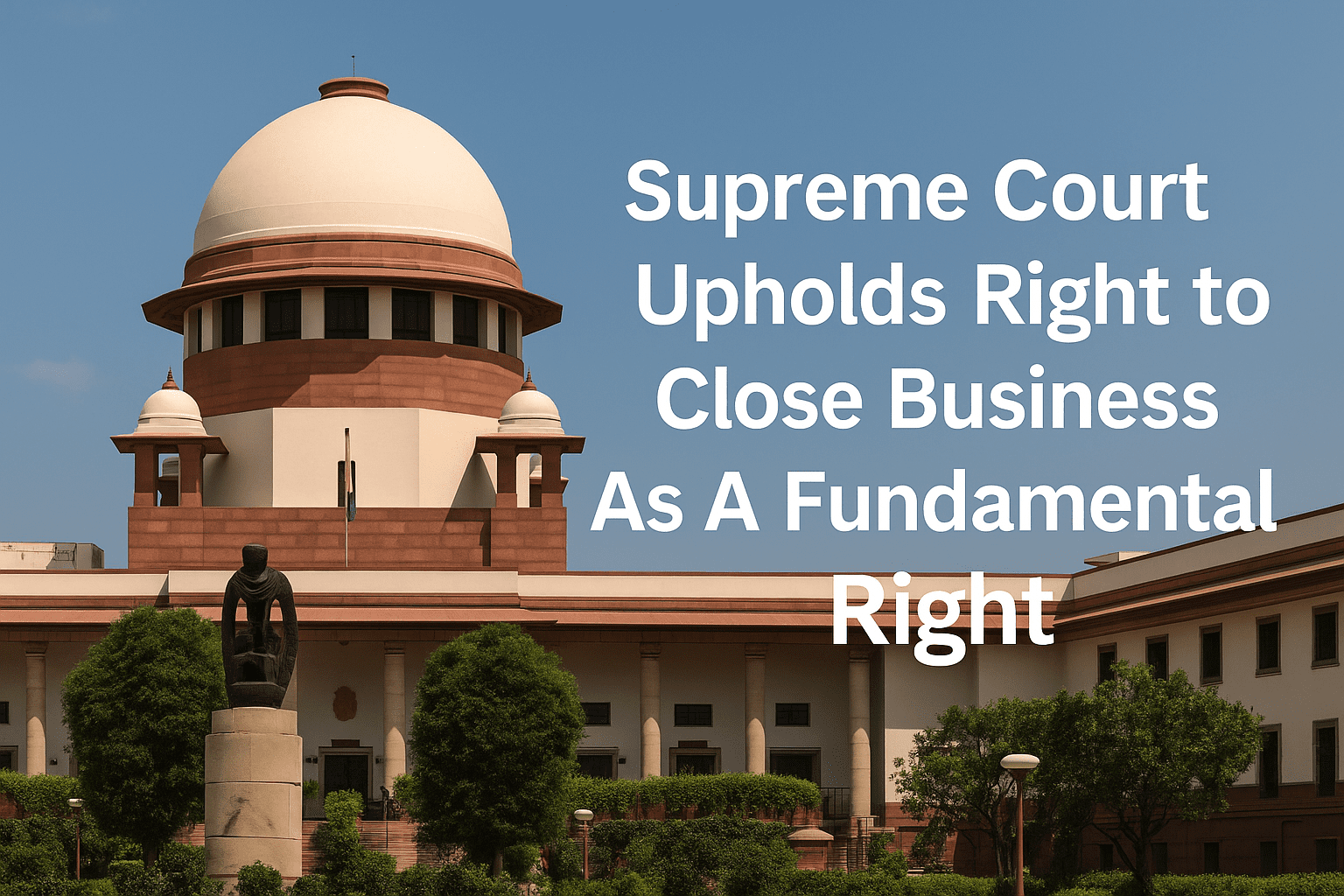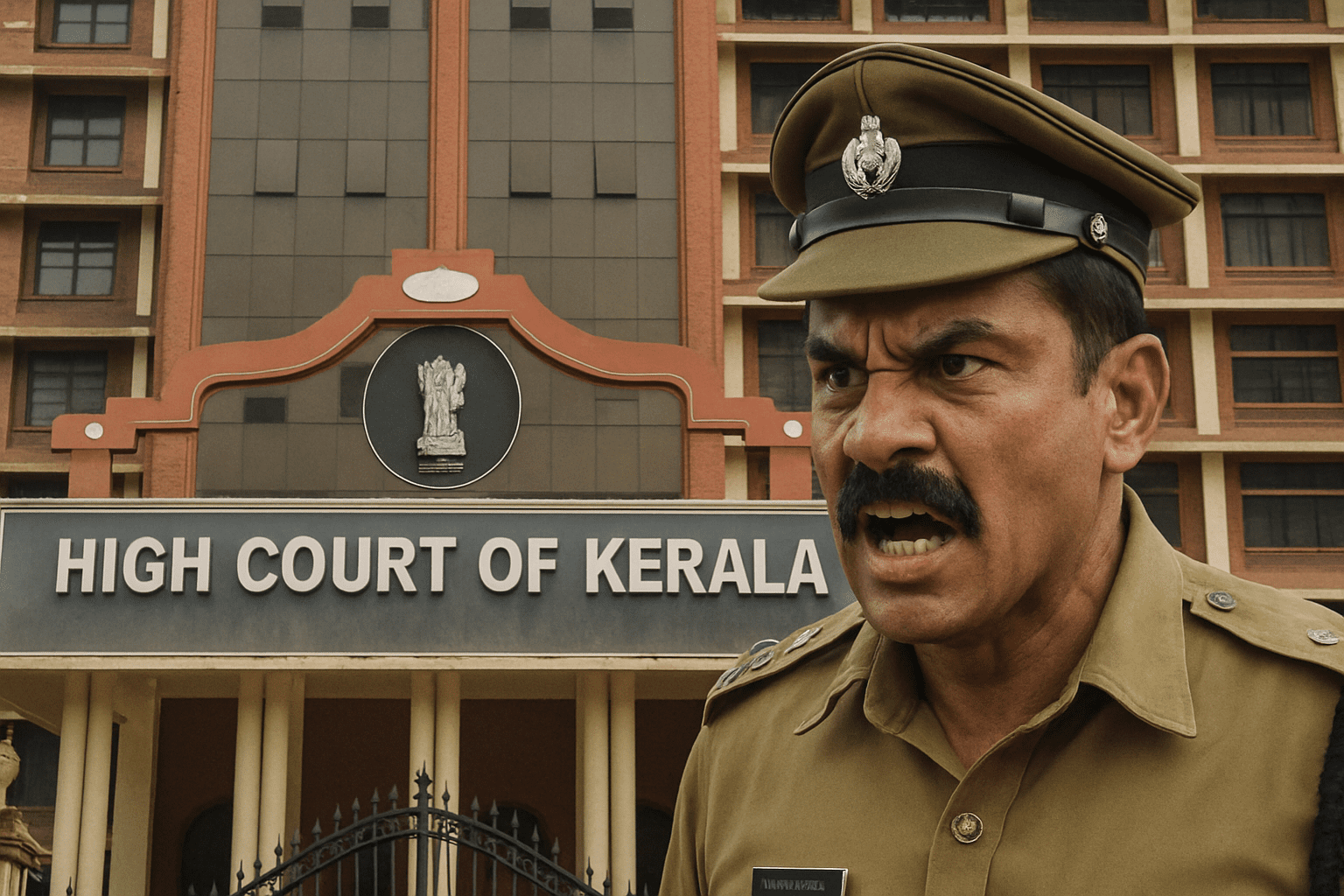Supreme Court Upholds Right to Close Business As A Fundamental Right. Supreme Court Upholds Right to Close Business As A Fundamental Right. In a significant ruling, a two-judge Supreme Court bench comprising Justices Sanjay Karol and Prashant Kumar Mishra clarified that the fundamental right under Article 19(1)(g) of the Constitution which guarantees the freedom to practice any trade or business also includes the right to shut down that business. However, this right is not absolute and is subject to reasonable restrictions aimed at protecting workers and ensuring compliance with statutory procedures. Background of the Case The case arose from appeals filed by Harinagar Sugar Mills Ltd. (HSML) challenging Bombay High Court orders related to the closure of its biscuit manufacturing division. HSML had operated exclusively for Britannia Industries Ltd. (BIL) for over 30 years under Job Work Agreements (JWAs). In 2019, BIL terminated the agreement, prompting HSML to seek closure under the Industrial Disputes Act, 1947. HSML submitted a closure application on August 28, 2019, under Form XXIV-C as per Maharashtra’s rules. However, the Deputy Secretary of the Maharashtra Government rejected it as “incomplete,” demanding resubmission. Despite HSML’s efforts to provide additional details, the process was delayed. Workers’ unions approached the Industrial Tribunal, seeking restraint on closure, which was granted. HSML’s subsequent petitions were dismissed by the High Court, leading to the Supreme Court appeal. Key Arguments HSML argued that: – Its August 28, 2019, application was complete, and the 60-day statutory period for deemed closure had lapsed by October 2019. – Only the Minister was the competent authority under Section 25-O of the Industrial Disputes Act, and the Deputy Secretary had no power to demand revisions. – The termination of the BIL agreement left no alternative business avenues, making closure inevitable. The government and workers’ unions, however, contended that the application was incomplete and closure should be restrained to safeguard workers’ interests. Supreme Court’s Findings The Court held that: 1. HSML’s closure application was valid from August 28, 2019, and the 60-day deemed closure period had expired in October 2019. 2. The Deputy Secretary was not the “appropriate Government” under Section 25-O, and the Minister’s failure to independently assess the application rendered the Deputy Secretary’s communications invalid. 3. HSML had legitimate reasons for closure, given its exclusive reliance on BIL’s business. The Court referenced its Constitution Bench ruling in Excel Wear, affirming that while Article 19(1)(g) includes the right to close a business, it remains subject to reasonable restrictions under labor laws. Final Ruling The Supreme Court: – Allowed HSML’s appeals, setting aside the High Court orders. – Declared the closure valid from August 28, 2019, recognizing the lapse of the 60-day period. – Held that the Deputy Secretary’s interference was unlawful and the Minister’s inaction was a legal defect. – Enhanced worker compensation by ₹5 crores, in addition to amounts already paid, directing disbursal within eight weeks. Case Title: Harinagar Sugar Mills Ltd. (Biscuit Division) & Anr. v. State of Maharashtra & Ors. Home – The Law Office Of MKH
Police cannot refuse to register FIR even if complainant resides in a foreign country.
Police cannot refuse to register FIR even if complainant resides in a foreign country. Police cannot refuse to register FIR even if complainant resides in a foreign country. The Kerala High Court recently ruled that police cannot refuse to register a First Information Report (FIR) for a cognizable offense, even if the complaint originates from a foreign country. This ruling came in a case where an Indian citizen residing in Australia, the petitioner, filed a complaint against her husband via email to the Director General of Police (DGP), Kerala, in 2020.Despite the DGP forwarding the complaint to the jurisdictional Muttom Police Station, no action was taken. The Station House Officer (SHO) informed the petitioner that an unsigned email complaint couldn’t be accepted and that her personal presence was required, which was difficult due to her residence in Australia.Aggrieved by the police’s inaction, the petitioner challenged the SHO’s decision. Dr. Justice Kauser Edappagath, in the judgment, highlighted that the concept of “Zero FIR” is now statutorily recognized under Section 173 of the Bharatiya Nyaya Sanhita (BNSS), 2023.The Court emphasized that Zero FIR aims to allow victims to file complaints regardless of jurisdiction. Therefore, police cannot refuse to register an FIR if a cognizable offense is disclosed, even if the complaint is sent from abroad. Section 173 BNSS mandates police officers to record information about cognizable offenses regardless of where the crime occurred or how the information was received (orally or electronically).The Single Judge disposed of the petition after the petitioner agreed to file a fresh complaint. However, a clear directive was issued to the Muttom Police Station SHO to act upon any complaint filed by the petitioner, strictly following the procedure outlined in Section 173 BNSS.The case was titled XXX v. State of Kerala and Ors. (Crl.M.C. No. 4778 of 2020).
Court Slams Illegal Demolition & Orders ₹10 Lakh Compensation for “Bulldozer Justice”
Court Slams Illegal Demolition & Orders ₹10 Lakh Compensation for “Bulldozer Justice” Court Slams Illegal Demolition & Orders ₹10 Lakh Compensation for “Bulldozer Justice” In a stern rebuke of unlawful executive action, the Orissa High Court has ordered the State to pay ₹10 lakh in compensation for illegally demolishing a community center, with ₹2 lakh to be recovered from the salary of the responsible Tahasildar. The court condemned the blatant disregard for judicial orders and procedural safeguards, terming it a dangerous trend of “bulldozer justice.” The dispute centered around a goshtigruha (community center) built on land classified as gochar (grazing land) under the Odisha Prevention of Land Encroachment Act, 1972 (OPLE Act). The structure, existing since 1985 and reconstructed in 2016-18 using public funds, served public welfare programs. Despite its long-standing presence, authorities initiated encroachment proceedings in July 2024. The petitioners challenged the eviction notice before the High Court, which directed them to seek settlement under Section 8A of the OPLE Act. Their application was rejected, prompting an appeal before the Sub-Collector. Despite the High Court’s interim order restraining eviction on 29.11.2024, a fresh demolition notice was issued on 05.12.2024. The court reiterated its stay on 13.12.2024, but shockingly, the Tahasildar proceeded with the demolition the next morning, even as the appellate authority was yet to pronounce its verdict. Justice Sanjeeb Kumar Panigrahi lambasted the executive’s “steady and conscious departure” from legal norms, emphasizing that the demolition was carried out while judicial proceedings were pending. The court noted that the executive’s actions reflected a “deeper disregard for constitutional process and institutional boundaries,” violating Supreme Court mandates on procedural safeguards in demolition cases. The judgment highlighted that the Tahasildar’s haste was not merely an administrative lapse but a deliberate defiance of judicial authority. “When the State demolishes a structure knowing that a judicial body is seized of the matter, it undermines the rule of law,” the court observed. The demolition, executed without a 15-day notice or video documentation as required by the Supreme Court, was deemed a “compound violation of lawful governance.” The court expressed grave concern over the growing trend of “bulldozer justice,” where executive actions bypass legal processes. “It is not the bulldozer that offends constitutional sensibilities, but its deployment before the law has spoken,” the judgment stated. The bench underscored that such actions erode public trust in institutions and violate the substantive right to property under Article 300-A of the Constitution. Considering the breach of judicial orders, procedural violations, and the loss suffered, the court awarded ₹10 lakh in compensation, with ₹2 lakh to be deducted from the Tahasildar’s salary. The State was directed to reconstruct the community center within three months. Additionally, departmental proceedings were ordered against the Tahasildar, and the Chief Secretary was instructed to issue fresh guidelines aligning with Supreme Court directives on demolitions. The Orissa High Court’s ruling serves as a strong deterrent against arbitrary executive actions, reaffirming that the rule of law must prevail over administrative impunity. By penalizing the errant official and compensating the victims, the judgment upholds constitutional accountability and safeguards citizens’ rights against unchecked state power. Case Title: Kumarpur Sasan Juba Gosti Kendra & Ors. v. State of Odisha & Ors.Judgment Date: June 20, 2025



